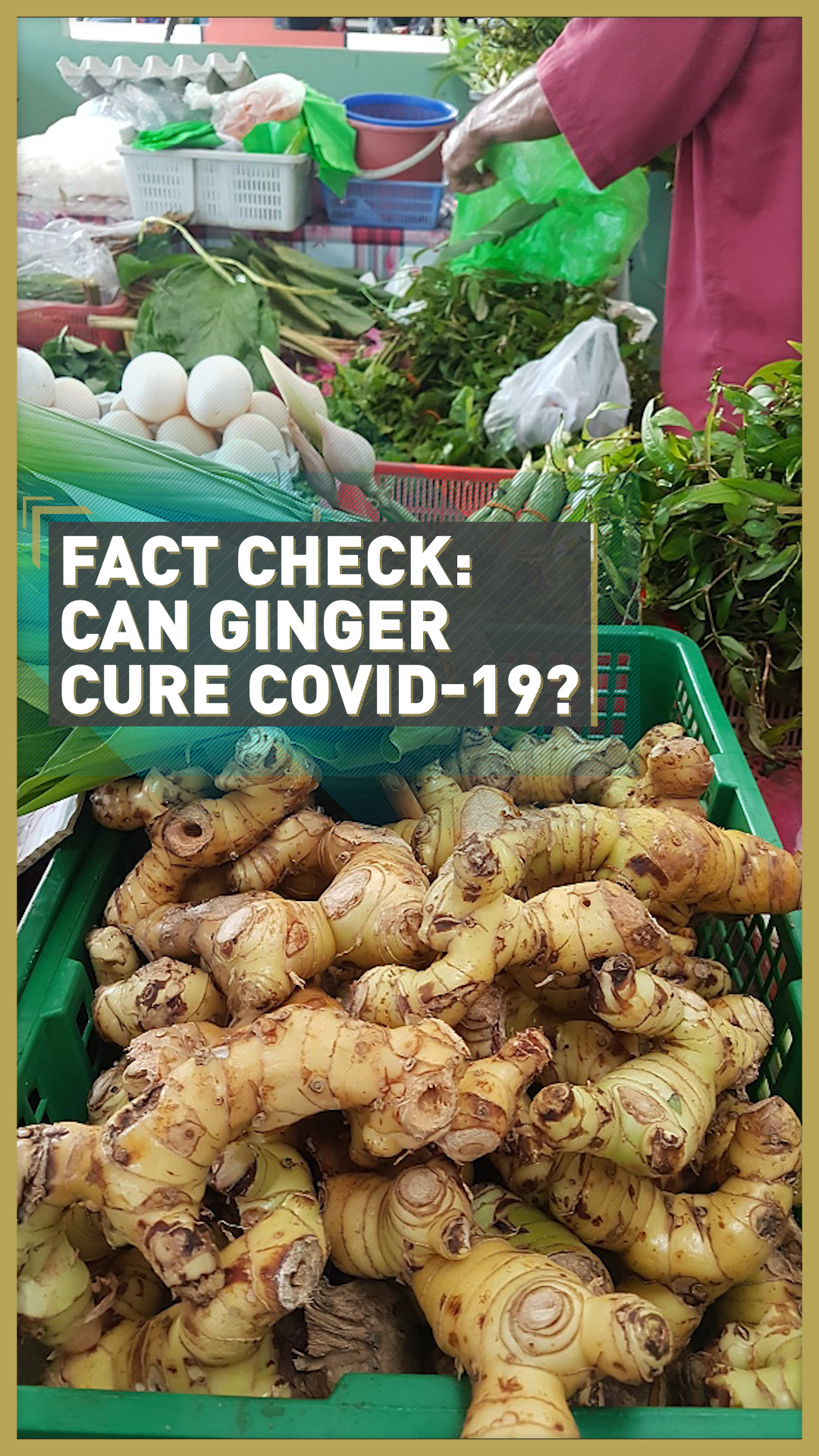01:48

The World Health Organization (WHO) has said that while natural remedies such as ginger can have a "positive impact on your health," they are by no means a medically proven treatment for fighting COVID-19.
Michael Ryan, executive director of the WHO Health Emergencies Program, made the comments after posts continued to be widely shared on social media touting ginger and other natural remedies as cures for the novel coronavirus.

The WHO said ginger is not a medically proven treatment for fighting COVID-19. /VCG
The WHO said ginger is not a medically proven treatment for fighting COVID-19. /VCG
"I think we have to be careful with what we would consider to be the traditional remedies that people use for making themselves feel better," said Ryan during a press briefing from Geneva on Wednesday.
He added: "During a common cold or the flu or any illness… some of us like to take a drink with honey, some like to take ginger, some of us take special herbal teas.
"Anything that makes one feel better, anything that provides that reassurance and anything that you believe can help your health that's not dangerous certainly has a positive impact on your health, but it's a different thing to say that something is effective in treating the disease," he added.

Ginger is a natural anti-inflammatory and anti-oxidant. /Dinodia Photos / Getty Creative / VCG
Ginger is a natural anti-inflammatory and anti-oxidant. /Dinodia Photos / Getty Creative / VCG
Ryan's statement comes as governments attempt to tackle misinformation being spread on social media about effective cures for the novel coronavirus, with ginger – a natural anti-inflammatory and antioxidant – a recurring feature of such remedies.
Multiple posts have been shared tens of thousands of times on Facebook claiming that ginger can cure the novel coronavirus if it is boiled and eaten on an empty stomach.
One post that was shared more than 38,000 times read: "Cure for coronavirus – In case you contract this... don't eat for 24 hours. And boil ginger and drink it like water but it has to be hot... You will drink it for 3 days continuously."

Multiple posts have been shared tens of thousands of times on Facebook claiming that ginger can cure the novel coronavirus if it is boiled and eaten on an empty stomach. /VCG
Multiple posts have been shared tens of thousands of times on Facebook claiming that ginger can cure the novel coronavirus if it is boiled and eaten on an empty stomach. /VCG
Health experts, including the WHO, have rejected such home remedies as cure-alls against COVID-19, and have warned against sharing advice that hasn't been approved by recognized health institutions or doctors.
Facebook, alongside social media competitors including Twitter and YouTube, have also started barring users from posting harmful information about COVID-19 on its platforms, with several African nations teaming up with such technology giants to fight misinformation on the continent.
Twitter has also been tweaking its algorithm to elevate medical information from authoritative sources – an initiative available in 70 countries.
South Africa's president, Cyril Ramaphosa, made clear his concern when he declared a national disaster in March.
"Perhaps the greatest dangers to our country at this time are fear and ignorance," he said. "We should stop spreading fake and unverified news and creating further apprehension and alarm."

South Africa's president, Cyril Ramaphosa, has warned against misinformation. /Sumaya Hisham/ AP
South Africa's president, Cyril Ramaphosa, has warned against misinformation. /Sumaya Hisham/ AP
But despite the WHO throwing hot water on ginger as a cure-all for COVID-19, the medicinal qualities of the "wonder-root" has seen it fly off supermarket shelves around the world.
Some nations, such as Ethiopia, have reported a three-fold increase in ginger prices, with social media users around Europe complaining about shortages in supermarkets.
Dwindling supplies have in part been attributed to increased demand during the pandemic, but also the impact of the novel coronavirus on the root's supply chain.
The spread of COVID-19 has taken its toll on shipments from the world's biggest exporter of ginger, China, which has an export market worth $402 million per year according to global data analytics company Garay.

Dwindling supplies of ginger have in part been attributed to increased demand during the COVID-19 pandemic, but also the impact of the novel coronavirus on the root's supply chain. /AFP
Dwindling supplies of ginger have in part been attributed to increased demand during the COVID-19 pandemic, but also the impact of the novel coronavirus on the root's supply chain. /AFP
"Overseas market demand for Chinese ginger is still quite large, but many countries have closed their borders," Kevin Li, from the Chinese food import-export company Qingdao Sinonut, told the fresh produce industry news site Fresh Plaza.
"Chinese companies have difficulty transporting their products to overseas markets."
He added: "The COVID-19 pandemic has created much uncertainty in the international ginger market. Ginger exporters do not know whether their deliveries will reach the client on time or at all."
"Some Chinese companies therefore decided to limit their ginger export volume and in doing so avoid the risk of greater financial loss."
With the financial risks caused by the pandemic forcing a decline in exports, Li explained that the global ginger market would only get back to normal once the coronavirus crisis had subsided.
"Our export price increased by 20 percent and demand is still high, but only when the COVID-19 pandemic is under control can we increase our deliveries."
Until that point comes, those who are struggling to find ginger in the times of coronavirus may take solace in advice from the WHO's Michael Ryan:
"If you have your favorite remedy that you use... like ginger, please continue to support yourself through the illness, but please let us avoid making assumptions without evidence that certain things can cure COVID-19."
Source(s): AFP
,Reuters